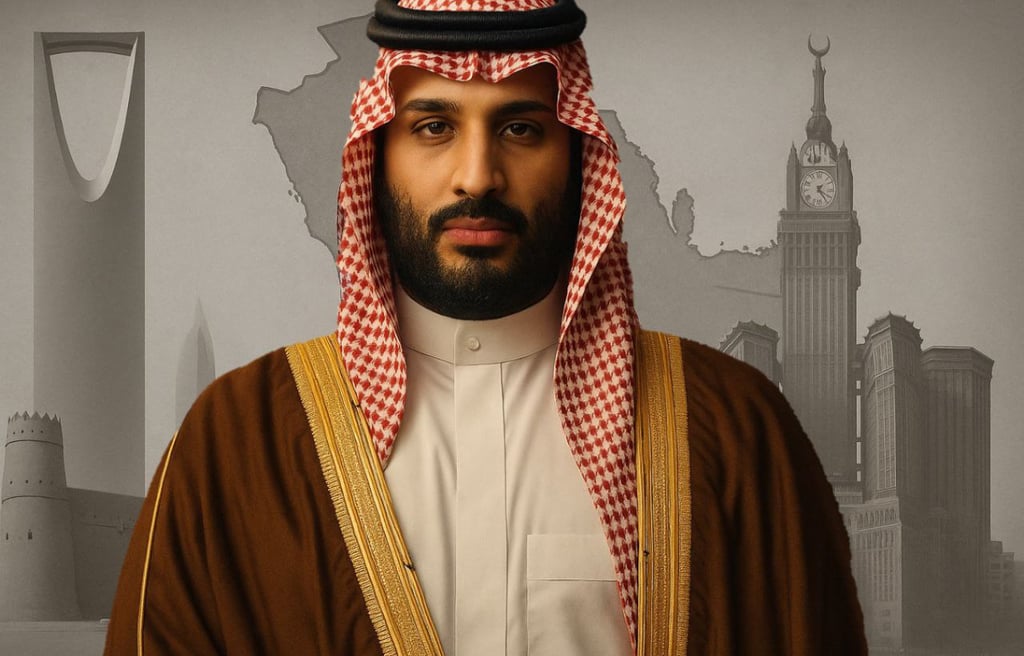The Middle East is Changing: So, Where Does Saudi Arabia Stand?
This article explores Saudi Arabia’s transformative rise as a decisive power in the Middle East, redefining regional politics after the decline of Iranian influence. It examines Riyadh’s strategic moves in Lebanon, Syria, Egypt, and its independent stance on normalization with Israel, marking a new era of political leverage and regional rule-setting.
7/9/20252 min read


The Middle East is undergoing a subtle transformation since the Al-Aqsa Flood, with Saudi Arabia’s role becoming more prominent. This rise is not accidental but the result of recent complex changes in the region. Iran, which has long entrenched its influence in the heart of the Arab East through its military and political arms, now finds itself on the defensive. It has lost not only geographical ground but also strategic leverage. With this exposure, Saudi Arabia becomes the main center of gravity for the Arabs — not as a reaction, but through proactive action.
Saudi Arabia’s ascent is characterized by efforts to strengthen international alliances while maintaining independence in decision-making. The United States, preoccupied with its economic conflict with China, seeks to reduce tensions in the Middle East by delegating trusted partners to manage regional files. Saudi Arabia, with its economic capabilities and political stability, is an effective partner.
Damascus — Beirut — Riyadh
In Lebanon, international efforts to support stability and development are increasing, while the French role declines somewhat. Saudi Arabia encourages Lebanese authorities to undertake political and economic reforms, strengthening partnerships and supporting national balances in the country’s interest.
In Syria, Saudi Arabia today plays a key role in efforts to support stability and peace in the region. Following the country’s transformations in December 2024, Saudi Arabia has worked to build bridges of understanding with various Syrian factions. The Saudi Crown Prince Mohammed bin Salman’s request to US President Donald Trump to ease sanctions under the Caesar Act and Saudi investments in Syria are clear evidence of these aims. Riyadh welcomed former President Bashar al-Assad at the 2024 Arab Summit under the slogan “Return to the Arab Fold.” However, Assad showed no positive steps toward the Arabs and insisted on remaining in the past, paying the price for his decisions.
Peace as a Pressure Card
Saudi Arabia’s position on normalization with Israel shows its independence within the regional balance. While Washington seeks to accelerate resolution of the file, Saudi Arabia refuses any concessions or steps before achieving a two-state solution and guaranteeing Palestinian rights. This refusal is not obstinacy but a calculated use of power cards. Riyadh thus gains an important negotiation card and strengthens its political legitimacy before both Arab public opinion and the international community, affirming it sets its own conditions.
A Policy Based on Responsibility
Saudi Arabia today does not seek to impose hegemony or direct intervention but focuses on building partnerships based on mutual interests and respect. Through flexible diplomatic tools and responsible policies, it contributes to forming a more stable and cohesive regional balance.
In this context, a new phase in Arab joint action is emerging, based on clarity and commitment, where cooperation is met with sincere support, and differences are left within the framework of constructive dialogue. Saudi Arabia appears as a reference power, keen to enhance Arab consensus and formulate initiatives serving regional stability, engaging in balanced interaction with influential international powers, helping to avoid open conflicts and promoting a climate of understanding and dialogue.
Contact me via email
SUBSCRIBE TO MY NEWSLETTER
hello@bilalnouraldeen.com
© 2025. All rights reserved.